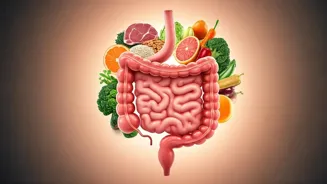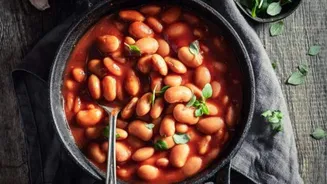Processed Meats
Processed meats, including bacon, sausages, and deli meats, have been linked to an elevated risk of colon cancer. These foods often contain nitrates and nitrites,
which, when cooked at high temperatures, can form carcinogenic compounds. The World Health Organization has classified processed meats as Group 1 carcinogens, meaning there’s sufficient evidence that they cause cancer. Consider swapping processed meats for leaner protein sources such as skinless chicken or turkey breast, or even fish. You can also introduce plant-based alternatives like lentils or beans into your diet to get protein and fiber.
Red Meat Consumption
Excessive consumption of red meat, particularly when cooked at high temperatures (like grilling or frying), is associated with an increased risk of colon cancer. High-heat cooking can create heterocyclic amines (HCAs) and polycyclic aromatic hydrocarbons (PAHs), which are known carcinogens. It's not necessary to completely eliminate red meat from your diet, but moderation is key. Try reducing the amount you consume, and choose leaner cuts. Consider using cooking methods like baking or steaming instead of high-heat methods. Lean proteins like chicken, turkey, or fish are great replacements. Furthermore, incorporating vegetarian meals with beans, lentils, and tofu is another option.
High-Sodium Foods
A diet rich in high-sodium foods and those preserved with high amounts of sodium is a concerning factor. Excess sodium consumption can damage the lining of the digestive tract, which in turn may elevate the risk of colon cancer. Commonly, these foods include canned soups, processed snacks, and preserved items. To limit your sodium intake, start by reading food labels and opting for low-sodium versions of your favorite products. Cooking more meals at home gives you control over the salt content, enabling you to use fresh herbs and spices to enhance the flavor of your dishes. Additionally, choose fresh or frozen vegetables over canned ones to avoid added sodium.
Sugary Drinks, Carbs
Excessive consumption of sugary drinks and high-glycemic refined carbohydrates contributes to various health issues, including the increased likelihood of colon cancer. Sugary beverages like sodas and sweetened juices can cause spikes in blood sugar levels and create insulin resistance. These conditions can potentially fuel the growth of cancer cells. Refined carbohydrates, such as white bread and pastries, also have a high glycemic index, leading to similar effects. To make a positive change, swap sugary drinks with water, unsweetened tea, or infused water. You may also opt for complex carbohydrates (whole grains) instead of refined ones to assist in maintaining stable blood sugar levels, and consume fiber-rich foods.
Alcohol Consumption
Excessive alcohol intake is another element that can affect your colon health. The liver breaks down alcohol, and the by-products can cause damage and inflammation. Chronic alcohol consumption has been associated with an elevated risk of developing colon cancer. Moderation is the key; if you consume alcohol, stick to the recommended guidelines (one drink per day for women and up to two drinks per day for men). Consider non-alcoholic beverage alternatives, like sparkling water with a slice of lemon or a non-alcoholic cocktail, to maintain your social life without the adverse health effects of alcohol.
Ultra-Processed Foods
Ultra-processed foods, commonly including fast foods and packaged snacks, tend to be high in unhealthy fats, added sugars, and sodium, while being low in fiber and essential nutrients. These foods are often engineered to be highly palatable, leading to overconsumption and weight gain, all contributing factors to increased colon cancer risk. Minimizing ultra-processed food intake is key. Focus on whole, unprocessed foods, like fresh fruits and vegetables, lean proteins, and whole grains. Planning your meals and preparing them at home is a great strategy for ensuring you have healthy options available and avoiding impulsive unhealthy choices.
High Saturated Fats
Diets high in saturated fats, particularly those found in some dairy products, can influence the risk of colon cancer. Saturated fats may contribute to inflammation and affect the gut microbiome, potentially promoting the development of cancerous cells. You can reduce your intake of saturated fats by choosing leaner protein sources, such as poultry without the skin or fish, instead of high-fat cuts of meat. Swap whole-fat dairy products for low-fat or non-fat versions. Moreover, incorporating more fiber-rich foods, like fruits, vegetables, and whole grains, can aid in overall colon health and reduce the adverse impacts of fat consumption.














